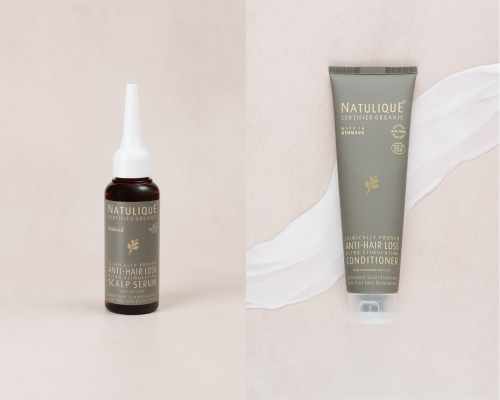Introduction to hair loss
Hair loss is a problem that affects millions of men and women around the world. However, understanding how to stimulate hair regrowth naturally can provide an effective solution to this often stressful and uncomfortable phenomenon. A variety of factors can contribute to hair loss, and it's essential to be aware of them in order to adopt the right practices to promote healthy, vigorous hair growth. This article explores the common causes of hair loss to help you better understand this phenomenon and how to remedy it.
Common causes of hair loss
Heredity
Visit hair loss hereditary alopecia, also known as androgenic alopecia, is undoubtedly one of the most widespread causes of the problem. This type of alopecia is genetically programmed and generally manifests itself as a progressive reduction in hair density, in both men and women. Men can often start to lose their hair as early as their twenties, while in women, it generally manifests itself later.
Stress and illness
Stress and certain illnesses can also trigger temporary hair loss. Known as telogen effluvium, this phenomenon occurs when the body is subjected to significant physical or emotional stress, disrupting the natural hair growth cycle. In many cases, stress-induced hair loss is reversible once the stress is reduced. Certain illnesses such as thyroid disorders, lupus or diabetes can also cause significant hair loss.
Bad habits and hair routines
Among the causes hair lossHowever, it's important to take into account our own hair care habits. Aggressive hair care products, excessive heat from styling tools such as straightening irons and hair dryers, and overly tight styling practices such as braiding, can contribute to hair damage and accelerate hair loss. Adopting a gentler hair care routine and using products suited to your hair type can reduce the risk of hair loss due to mistreatment.
By recognizing these different causes, we can better target the specific factors responsible for hair loss, and choose appropriate methods to naturally stimulate hair regrowth. From dietary advice to essential oil treatments, adopting a holistic approach can provide an effective response to this common problem.
Essential foods and nutrients for hair growth
The importance of a balanced diet
Proteins
Proteins are essential for the very structure of our hair. Hair is mainly made up of keratin, a fibrous protein. Insufficient protein intake can result in fine, brittle hair. To promote hair regrowth, include quality protein sources in your diet, such as lean meat, fish, eggs and legumes.
Vitamins (A, C, D, E)
Each vitamin plays a specific role in hair health:
- Vitamin A : Essential for cell renewal, it helps maintain a healthy scalp.
- Vitamin C : Antioxidant, it helps collagen production and facilitates iron absorption.
- Vitamin D : Role in creating new follicles and maintaining hormonal balance.
- Vitamin E : Protects hair from oxidative damage and promotes healthy blood circulation in the scalp.
Including foods rich in these vitamins in your diet, such as carrots, citrus fruits, dairy products and nuts, can have a significant impact on the quality of your hair.
Minerals (Iron, Zinc)
Minerals also play a crucial role in hair health:
- Iron : It is vital for the oxygenation of hair follicles. Iron deficiency can lead to anemia, often associated with hair loss.
- Zinc : It helps repair capillary tissue and ensures proper functioning of the sebaceous glands around hair follicles.
Eat foods such as lentils, spinach, lean beef and pumpkin seeds to ensure a good supply of iron and zinc.
Superfoods for hair growth
Eggs
Rich in protein and biotin, eggs are a superfood for hair health. Biotin is a B vitamin crucial to keratin production, making it essential for hair growth. Eating eggs often can strengthen and thicken your hair.
Spinach and other leafy vegetables
Spinach is an excellent source of iron, vitamins A and C, and folic acid. These nutrients promote the production of sebum, which keeps the scalp healthy, and contributes to hair growth. Adding green leafy vegetables to your daily meals provides hair and scalp with the nutrients needed for good hair health.
Chia and flax seeds
Rich in omega-3 fatty acids, chia and flax seeds are ideal for deeply moisturizing and nourishing hair. Omega-3 fatty acids are renowned for their ability to reduce inflammation, promote circulation in the scalp, and strengthen hair follicles. Incorporating these seeds into your diet, particularly in smoothies, salads or yoghurts, can significantly improve the texture and strength of your hair.
By adopting a balanced, nourishing diet, you can considerably increase your chances of stimulating hair regrowth and maintaining optimal hair health.
See also: How do you achieve even bleaching all over your hair?
Using essential oils to stimulate hair growth
Principle of essential oils for hair
Essential oils have long been used in hair care for their beneficial properties. They offer a natural approach to promoting hair growth by supplying essential nutrients to the scalp and stimulating blood circulation. The antibacterial and antifungal properties of certain essential oils also help maintain a healthy scalp, reducing the risk of dandruff and infections that can disrupt normal hair growth.
Castor oil
Known for its nourishing properties, castor oil is particularly rich in omega-6 and 9 fatty acids, as well as vitamin E. This nutritious cocktail strengthens hair fibers, deeply moisturizes and stimulates hair growth. Its thickening effect is also an asset for those seeking to densify their hair. When massaged into the scalp, castor oil improves blood circulation and promotes hair follicle regeneration.
Jojoba oil
Jojoba oil, close to the natural sebum produced by our sebaceous glands, is an excellent option for those with oily or unbalanced scalps. Its moisturizing properties help regulate sebum production, preventing greasy roots and dry ends. It also helps remove residues from hair products, leaving the scalp clean and ready for new growth. Jojoba oil nourishes hair while adding softness and shine.
Sweet almond oil
Rich in vitamins A, B and E, sweet almond oil is an excellent choice for nourishing and revitalizing dry, brittle hair. In addition to its moisturizing properties, it helps soothe scalp irritations, often responsible for hair loss. Its light texture enables rapid penetration without weighing hair down, promoting healthy regrowth. Regular massage with sweet almond oil can strengthen hair and improve its elasticity.
How to use essential oils for hair
Proper and regular application of essential oils is crucial to reap their full benefits. Here are a few simple ways to incorporate them into your hair routine:
- As a hair mask : Mix a few tablespoons of the oil of your choice with another base oil such as coconut oil. Apply evenly to wet or dry hair, concentrating on scalp and lengths. Leave on for 30 minutes to overnight for optimum hydration, then rinse with a mild shampoo.
- Massage: Use a few drops of pure essential oils to gently massage the scalp for 5 to 10 minutes. This stimulates blood circulation, promoting new hair growth.
- Add to hair care products: Add a few drops of essential oil to your shampoo or conditioner to enjoy their benefits with every wash.
- As a leave-in care product: Apply a small amount of a lighter oil to damp ends to protect them from external aggressors and prevent split ends.
When choosing essential oils, prefer organic and unrefined versions to guarantee the purity and efficacy of the essences used. Always consider possible sensitivities or allergies by performing a skin test before any extensive use.
Healthy lifestyle practices to promote hair growth
The importance of general health for hair
Hydration
Hydration is crucial to the overall health of the body, including the hair. Drinking enough water keeps the scalp hydrated and promotes an environment conducive to hair growth. A well-moisturized scalp reduces the risk of dandruff and irritation, which can hamper hair growth.
Quality sleep
Sleep has a significant impact on hair health. During sleep, the body repairs and regenerates cells, including those in the hair follicles. A lack of sleep can lead to hormonal imbalance, potentially responsible for hair loss. Aim for 7 to 9 hours of quality sleep a night to support cell regeneration and maintain healthy hair.
Stress management
Chronic stress can contribute to hair loss. Effective stress management through techniques such as meditation, yoga or regular exercise can help reduce the negative effects of stress on hair health. By incorporating these practices, you reduce the hormonal impact of stress, thus promoting better hair growth.
Avoiding harmful hair care practices
Reduced use of excess heat
Heated tools such as hair dryers, straightening irons and curling irons can cause considerable damage to hair. Limit their use and opt for a lower temperature. Use heat protection products to minimize damage and preserve your hair's health.
Choosing gentle hair care products
Using harsh chemicals can weaken hair. Opt for sulfate- and silicone-free shampoos and conditioners. These gentle cleansers respect the hair fiber and scalp, supporting hair quality and growth.
Protective hairstyles
Choosing hairstyles that don't pull too hard on the scalp is essential for preventing hair breakage and loss. Protective hairstyles like loose braids or soft buns protect strands from excessive handling and environmental aggression.
FAQ
Which foods promote hair regrowth?
Foods rich in protein, vitamins and minerals, such as eggs, spinach and oily fish, are beneficial for hair growth.
Do dietary supplements help hair growth?
Dietary supplements can fill nutritional gaps, but it's best to consult a health professional before incorporating them into your routine.
How often should I cut my hair to promote growth?
We recommend trimming the tips every 2 to 3 months to eliminate split ends and promote healthy growth.
Can essential oils cause allergies?
Yes, some people can be sensitive to essential oils. Perform a skin test before regular use to avoid allergic reactions.
Does scalp massage help hair regrow?
Yes, scalp massage improves blood circulation, nourishing hair follicles and stimulating hair growth.
By adopting a healthy lifestyle, using gentle products and nourishing your hair from within, you can effectively stimulate its natural regrowth. These practices, combined with good stress management and restful sleep, create the fertile ground necessary for strong, healthy hair.



